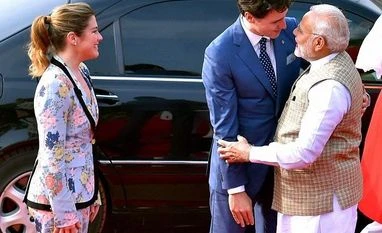However, the orchestrated bonhomie of hugs between Trudeau and Modi, and pictures the Canadian PM, his wife and three children, couldn't hide the frostiness between the two sides because of Trudeau and his party's support to Khalistani groups in Canada.
In his speech at the joint media conference after the delegation level talks, Modi didn't mince words about the pro-Khalistan approach of his Canadian counterpart.
Modi said those challenging India's sovereignty, unity and integrity cannot be tolerated. The PM said there cannot be any place for those who misuse religion for political motives and promote separatism.
India and Canada signed agreements to deepen cooperation in higher education, information, communication technology and electronics, intellectual property rights, renewable energy, sports and science and technology. Modi said Trudeau and he agreed to deepen defence cooperation.
Apart from issuing the customary joint statement, the two sides also signed a framework for cooperation on counter terrorism and violent extremism.
The framework said the two countries would work together to neutralize, among other groups, threats from Babbar Khalsa International and International Sikh Youth Federation. The framework stated that it is based on fundamental respect for the sovereignty, unity and territorial integrity of India and Canada.
The joint statement recognized the "importance of civil society groups as a mainstay of democratic societies." The two sides resolved to "intensify" negotiations to finalise a Comprehensive Economic Partnership Agreement (CEPA) and a Bilateral Foreign Investment Promotion and Protection Agreement (FIPPA).
It said India and Canada will work closely together to finalise an arrangement within 2018 to enable the export of Canadian pulses to India. Modi and Trudeau agreed to expand the scope of the Canada-India Ministerial Energy Dialogue to additionally include electricity, energy efficiency and renewables, and also welcomed the cooperation in civil nuclear energy sector.
India and Canada also agreed to expand security cooperation through the institutionalisation of NSA (National Security Adviser)-level dialogues and regular convening of Foreign Minister-level strategic dialogues.
Modi and Trudeau also expressed "strong concern" about recent developments in Maldives and their implications for a free society. They urged the Maldivian government to ensure early resumption of the political process after revoking the state of emergency.
Earlier in the day, External Affairs Minister Sushma Swaraj met the Canadian PM.
To read the full story, Subscribe Now at just Rs 249 a month
Already a subscriber? Log in
Subscribe To BS Premium
₹249
Renews automatically
₹1699₹1999
Opt for auto renewal and save Rs. 300 Renews automatically
₹1999
What you get on BS Premium?
-
Unlock 30+ premium stories daily hand-picked by our editors, across devices on browser and app.
-
Pick your 5 favourite companies, get a daily email with all news updates on them.
Full access to our intuitive epaper - clip, save, share articles from any device; newspaper archives from 2006.
Preferential invites to Business Standard events.
Curated newsletters on markets, personal finance, policy & politics, start-ups, technology, and more.
Need More Information - write to us at assist@bsmail.in
)